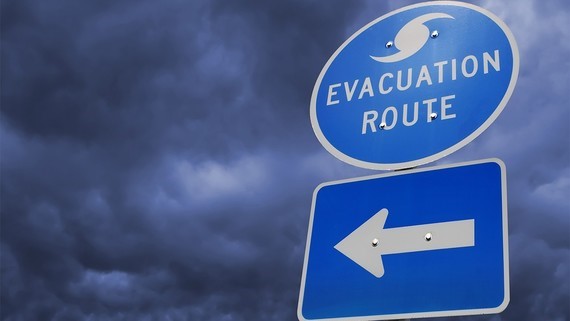Hurricane Season Has Officially Begun: Here’s What to Know Before a Storm Forms

Wednesday, June 3, 2020 2:07 PM
The 2020 Atlantic hurricane season is expected to be more active than usual with up to 19 named storms and from six to 10 hurricanes, three to six of which could be a Category 3 or higher, according to the National Oceanic and Atmospheric Administration.
Before hurricane season officially began on Monday, June 1, the National Hurricane Center had already tracked two tropical storms — Arthur and Bertha — and by the afternoon of Tuesday, June 2, a third had formed, Tropical Storm Cristobal in the Gulf of Mexico.
Over the past four years, Beaufort County has been evacuated four times (for Hurricane Matthew in 2016, Tropical Storm Irma in 2017, Hurricane Florence in 2018, and Hurricane Dorian in 2019).
This recent storm history makes it all the more important for County residents to stay informed and make preparations ahead of a potential storm, particularly as we continue to navigate the unknowns of the COVID-19 pandemic.
WHAT YOU CAN DO NOW
Read: South Carolina’s Emergency Management Division has released its annual hurricane guide. Click here to download it.
In the guide, you’ll find:
- Flood zone maps
- Evacuation routes
- Tips on preparation
- Important contacts
- Information about storm surges and power outages
- Shelter and insurance information
- Emergency plan suggestions for those with pets
- Ideas for a basic disaster supplies kit
Subscribe: If you’d like to receive direct announcements and alerts from Beaufort County through text or email, sign up by clicking on the link below and entering your information:
Follow: In the days leading up to a potential hurricane or tropical storm, it is helpful to already be following the official social media pages of various public agencies.
These official sources on social media will help you stay informed:
Beaufort County
The Beaufort County Sheriff’s Office’s Emergency Management Division leads the County’s response to natural disasters and will be the primary source of local information when a storm threatens.
After a storm has passed, operations then shift to the Beaufort County Disaster Recovery.
For regular updates on preparations, County road and traffic changes, live-streams of state and local press conferences, evacuation orders, recovery efforts, County services, and post-storm damage reports, follow:
- Beaufort County Sheriff’s Office
- Beaufort County Emergency Management Division
- Beaufort County Government
Municipalities
Likewise, town and city leaders will regularly update their residents with live-stream videos, messages from elected leaders, and detailed information specific to their localities. Follow:
South Carolina
Announcements from Gov. Henry McMaster’s office and state emergency management officials can be found on Twitter:
And on Facebook:
Bookmark: Staying prepared also means paying attention whenever a storm forms in the Caribbean or off the Atlantic Coast. As a storm organizes and gains strength, the potential path becomes more clear. Two important weather sites to bookmark ahead of time are:
National Hurricane Center: The NHC will provide regular updates on the hurricane’s potential timing, path, wind speeds and storm surge. In the days leading up to a potential landfall, updates are typically provided every three hours.
National Weather Service: The NWS in Charleston provides more location-specific forecasts for potential flooding and wind speeds.
Consider: In the event an evacuation is called for Beaufort County, where would you go?
If staying with family or friends who live inland is an option for you, it is a good idea to make those arrangements ahead of time, while taking into account the potential effects of and any vulnerabilities to COVID-19.
If you intend to use a public shelter, the locations of which are outside Beaufort County and will be announced once an evacuation has been ordered, make plans to evacuate early. Because of COVID-19, shelters won’t be able to accommodate as many people and therefore will be first come, first served.
For more tips on what you can do now to ensure the safety of you and your loved ones in the event of a hurricane, click here.